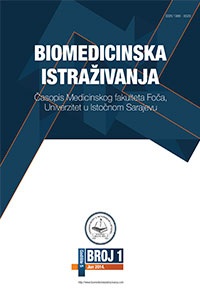Internet and computer addiction: “new age” disease of the 21st century
DOI:
https://doi.org/10.7251/BII1501069MAbstract
The aim of this paper is to give a brief overview of research and the newesttheoretical considerations on internet addiction classification and treatment.
Over the past years we have been increasingly facing the so-called “new
age” disease of internet addiction as a serious problem affecting numerous
people, especially the young population who has made social networks and
other internet contents a modus vivendi. A literature search was conducted for
the purpose of locating information on prevalence, diagnosis and treatment
of internet and computer addiction. Certain researchers and psychiatrists
believe that the excessive internet use is a symptom of other disorders, such
as depression and anxiety, or impulse control disorder. However, over the
past few years a consensus has been reached that this constellation of symptoms
is actually an addiction disorder. The American Society of Addiction
Medicine (ASAM) has recently come up with a new definition, according to
which addiction represents a chronic brain disorder. Consequently, the new
American Classification of Mental Disorders (DSM-V) has introduced this
form of addiction under the diagnostic category dubbed “cybernetic disorder”.
The field of internet addiction is advancing rapidly through its official
recognition as a separate and distinct addiction disorder. Some individuals
with internet addiction are at significant risk and merit professional care and
treatment. There are several treatments available, but the primary prevention
is the most effective intervention. Family practitioners and psychiatrists should
be taught to screen their patients for this disorder.
Downloads
Published
2015-07-23
Issue
Section
Чланци

